- Home
- Elizabeth Bear
Some of the Best from Tor.com: 2012 Edition: A Tor.Com Original Page 14
Some of the Best from Tor.com: 2012 Edition: A Tor.Com Original Read online
Page 14
Lenient, to give the worst possible punishment. Lenient. That was when I knew that I’d been set up—
The door burst inward, wood slats shattered and skittering across the floor with the force of the kick. Jada wrenched her hand free and dove for her bag, spilling the contents on the floor; Molly kicked her chair backward and lifted her hands in the air. As the police poured inside—four of them, menacing in identical black body armor and faceplates, shouting over one another—Jada pressed her back to the exam table and lifted a compact pistol from the clothes and tech scattered across the tile. She bared her teeth and stood, the gun sweeping toward Molly. Blood spattered from her wounded arm where it hung useless at her side.
Molly’s heart stopped at the sight of the gun, her gaze meeting Jada’s through a hot blur of tears. She opened her mouth to say anything—I’m sorry, I love you, you told me to do this—but the barrel moved past her completely and the roar of shots filled the tiny space. Molly screamed, hands flying to her ears. Her defensive curl obscured her vision for a span of seconds and so she missed Jada’s fall until she hit the floor at her feet.
Blood poured out of her like a river of red ore, viscous and hot. It spread in runnels between Molly’s feet. She pressed her hands to her mouth again, helpless, a high sound escaping between her fingers.
I’m old, Jada had said. That’s just how stories like mine end, Jada had said.
Molly took a shaking step back, and another, until she hit the wall. The blood followed her, grasping, and she rose up on her toes to get away.
“Ma’am,” one of the officers said. She half heard him through the ringing in her ears. “Are you all right?”
She tore her eyes from the blood only to see the terrible stillness of Jada’s flower-carved arm with its pale white fingers unfurled like petals. Old-fashioned bullets had torn into her torso, shredding cloth and flesh alike, a ruin of meat. Her face was strangely untouched, eyes open, lips parted as if to take breath.
“We apologize for firing in the closed space,” he said. “We have authorization to confirm your payment. Do you have your account information?”
Molly fumbled her tablet from her skirt and handed it to him. He tapped the screen several times, held his wristband to it for a flash of infrared, and handed it back.
“Thank you for your services,” he said. “We’ll handle the cleanup free of charge.”
“Yes,” she said numbly. “Yes, of course. Fifteen thousand?”
“Yes, ma’am,” he said.
The other officers were gathering Jada’s body between them onto a foldable stretcher. Molly’s knees knocked together and she nearly fell, a wave of vertigo smashing through her. Jada, vital and truthful and so fucking beautiful, was now a cold and crumpled thing, carved out of her and left on the floor. The officers hefted the stretcher between them. The same hand that had palmed burning-hot trails over Molly’s hip, her ribs, her stomach, lolled boneless in the air. The officers left as if assuming she would follow. Instead she collapsed into her chair and put her hands on the examination table, still warm. So was the sticky pool of rapidly darkening, drying blood under her feet.
“Fifteen thousand,” Molly said aloud.
It had happened faster than she’d anticipated. Her balance hadn’t returned; there was shock in its place, where the memory of Jada’s lips twisted in a final snarl had burned into her. She stood, jerky as if she were a puppet on strings, and went to the sink. She rinsed the scalpel again, and the tweezers, and the pan. She plucked a disinfectant wipe from the box and ran it over the utensils, then dropped them onto the exam table with a rattle. Making the decision—rolling the dice—hadn’t broken her. What that said about her, she wasn’t sure she wanted to know.
Molly who was not named Molly ran the wipe over her own forearm, cleaning the prickles of sweat from her skin. She took the scalpel in her free hand and traced a line that felt at first like nothing more than cold before it blossomed into a sharp hurt. There was a tale to tell, and a badge she had earned with murder.
“Her name was Jada,” she whispered to the empty room as she began her own work with her own canvas. “I don’t know if this is the proper way to do it, but this was her story. I think she wanted me to kill her.”
Copyright (C) 2012 by Brit Mandelo
Art copyright (C) 2012 by Rick Berry
The author and publisher have provided this e-book to you without Digital Rights Management software (DRM ) applied so that you can enjoy reading it on your personal devices. This e-book is for your personal use only. You may not print or post this e-book, or make this e-book publicly available in any way. You may not copy, reproduce or upload this e-book, other than to read it on one of your personal devices. Copyright infringement is against the law. If you believe the copy of this e-book you are reading infringes on the author’s copyright, please notify the publisher at: us.macmillanusa.com/piracy.
Contents
Copyright Notice
I
II
III
IV
V
VI
VII
I.
For most of my life I have allowed myself to think that jail is for other people. People I don’t need to think about. Drug dealers, career criminals, gang members, embezzlers, guys who don’t pay their child support. People getting what they deserve. But here I am. Again.
You want me to talk about utopia. Utopia here in the mountains. Utopia by the lake. Our utopia.
How I hacked the bio-monitoring system. How I took it over. The password to the artificial intelligence in the water treatment plant. Security holes. Intelligent agents. My keystroke loggers in the county equipment. My fascination with high-tech botany. All that. I’ll tell you, but it will take a while. But I guess we’ve got all night. It seems that I’m not going anywhere.
Who knew that the cops are all chipped like dogs? It’s a beautiful thing.
I know how this story begins. Here’s the sequence:
I was hauled out of bed by cops in the middle of the night.
I escaped out the side door with my kids.
We hid in the woods for hours.
We came back to the house eventually.
We hid in the basement.
Maybe I should be saying this with PowerPoint, projecting it all on the wall.
Helvetica Bold.
I got arrested.
I spent the night in jail.
Understand that this story sits on the surface of my skin, lives on the backs of my arms, and some days, there are no words. It’s a jail-based utopia we live in.
The story starts in my bed. 11:30 p.m. A flashlight shining in my face. Police. What do the police want? Why are they in my bedroom?
Think fast. Don’t even consider using the W word — as in “do you have a warrant?” Respect authority if you want to come out of this alive.
I was asleep. This had never happened to me before. I handled it a lot better the next time.
Above the bed hangs a wedding kimono I bought in Tokyo, white with wide red borders embroidered with golden peacocks and red cherry blossoms. Henry’s got more shoes in the closet than I own, and there’s this whole suitcase of neckties…
OK. I get lost, following details down holes. I think you call it “avoidance.”
A friend of mine who is also a psychotherapist told me, “You need to stop thinking of this place as utopia. It’s not utopia. It’s a police state. The state troopers train here and they get to practice on us. Once they are competent to do their jobs, they get sent elsewhere.”
I’ll try again.
3:00 a.m. The police come in holding floodlights. The kids and I are back from our escape and are hiding in the basement, in my office, sleeping on gym mats and some of my quilts. The sheriff’s deputy—whose name I have repressed; let’s call him Officer Friendly—stands on the cement steps in my office diagonally across the room. Next to him is a plainclothes cop filming the scene with a great big video camera.
> Somewhere there exists a videotape of my arrest.
Officer Friendly said, “Come over here so you don’t traumatize your children.”
I didn't move. I stared him down, saying, “That horse is already out of the barn.”
We had been hiding in the woods for hours, and they were hunting us with cars and floodlights, and, I later found out, police dogs. When it seemed like this would go on all night, I let us back into the house, entering through my office using the key I’d left outside…
I didn’t leave my kids. Not except in handcuffs. I knew when they found us that there was nothing more I could do.
Officer Friendly hauled me to my feet, telling me I was under arrest, and handcuffed me.
He never read me my rights. He wasn’t big on cop formalities.
That night, as the cops were hauling me barefoot out my front door in a T-shirt and pajama bottoms and handcuffs, without my purse, I said to them, “Please don’t let out the cat.”
(The cops who raid my house have this habit of leaving the front door standing wide open.)
A short cop on my porch said, “You really screwed up,” as I was being stuffed in the squad car.
Officer Friendly charged me with resisting arrest for flinching when he grabbed me so hard that he left fingerprint-shaped bruises on my arms.
His paperwork would later say that this scene took place in Ticonderoga. He was not good with facts. Facts do not play a big role in his world.
Details.
I hate that man.
II.
Here are some hard-won facts from time sheets it took me a long time to get. On August 16, Officer Friendly punched in at 11 a.m. He didn’t punch out again until 6 a.m. on August 17; he billed it as twenty hours, though it was actually a nineteen-hour shift. The day before that, he’d worked noon until midnight. And the day before that, his timesheet shows he worked a seventeen-hour shift.
His partner’s timesheet shows she worked eighteen and a half hours covering the night of my arrest, and that she worked thirty hours in the two days previous. I have the documentation. I can prove it.
What else is on the videotape? Dishes in the sink? Henry’s piles of science fiction novels? The cat box? Or maybe they have videos of the inside of my neighbor Frank’s house, which they searched three times in the middle of the night without a warrant.
Afterward, Frank bought himself this great T-shirt to commemorate that night; in all capital letters, it says “INNOCENT BYSTANDER.”
The DA dropped all three charges. The downside of the DA dropping all charges against me is that my morbid curiosity as to what data they collected will never be satisfied. Or hasn’t been yet, anyway.
I have lost a lot of sleep trying to think about this. In the middle of the night—Was it last night? How long have I been here?—I got out of bed to look at my photos from about one month after the first home invasion.
And there they were: Henry’s photos of my bruises. He took them a couple of days after, but for some reason I didn’t upload them to my account until a month later. I’d thought I’d lost them.
There are four, two of each arm with and without flash. Henry took them at the instructions of my lawyer after my first appearance in court. I am wearing a sleeveless white shirt with pink cherry blossoms.
Below my arm is a construction of Tinkertoys; in the background, a brass sculpture that resembles Jonathan Livingston Seagull that my son bought at a yard sale.
There is something about the way I am holding my arms—more like a martial arts posture than a victim displaying an injury.
There is nothing in these photos that expresses how Henry feels. They’re purely instrumental, depicting bruises to be shown in court as part of my criminal defense.
One is the photo I copied for the quilt I never made, entitled “Officer Friendly Leaves a Bad Impression on Mother.” I bought pink fabric for my skin and blue and purple fabric for my bruises…
How odd that I wanted to make all this about me.
The way here was gradual. The environmentalism behind the creation of this place was simultaneous with the passage of the Rockefeller drug laws. The white rural poor have been disenfranchised to make way for a protected wilderness where there are no jobs. And so the State built prisons in the woods and shipped in the black urban poor in order to create jobs.
Then the money ran out and in came the tax rebellions, and the tax caps. The county built the Public Safety Building with the idea of renting out cells to the state and to the Feds and to Immigration Services, but the market collapsed.
And so they all had to get a lot more flexible about how all those empty cells were filled. They began taking prisoners from other states; prisoners from other countries; corporate prisoners; corporate prisoners from other countries: men, women, and children from nowhere, incarcerated for no reason.
So here we sit, you and I.
My fantasy was that I would exhibit the quilt at the county fair a dozen yards from where Officer Friendly would be at the sheriff’s department booth, fingerprinting little children—to prepare them for later life. I wanted to take a picture.
Did you know that the State now keeps a database of the kids’ biometrics? The equipment package that cops use at fairs is billed on the manufacturer’s website as “an important new tool in combatting juvenile delinquency.” The kids come away from the booth with a helium balloon, a couple of sheriff’s department temporary tattoos, a spiffy looking ID card, and a chipped dog tag.
The other day I found my photos of the escape route. I don’t remember taking them, but they exist. A day after the home invasion, I apparently walked the escape route with my camera.
I was arrested about three a.m. on the seventeenth. The long, leisurely process of getting me into a jail cell lasted most of the rest of the night. No one was in a hurry to allow me to get some sleep. So I spent most of the day of seventeenth sleeping off my misadventure.
They had me shower before my mug shot. But it confused them when I asked to comb my hair. Having me wash my hair before the photo was a deliberate tactic to make me look ridiculous. My wet hair was sticking out every which way; in the photo I probably look quite insane. I smiled for the mug shot.
I never did find out what they do about brushes and combs in that jail.
About 5:30 a.m., my captors gave me a bed. It may have been later, since Officer Friendly’s time sheet records him as punching out at six. It was cold in my cell, maybe sixty degrees, maybe colder, and the blanket they gave me was thin.
August 17 was the hottest day of the year! I looked it up.
The previous summer, without Henry’s permission, I brought home a friendly cat named Bro from the animal shelter. He’d lived in the shelter for a year and a half; he was a kitten who’d never been adopted because of his runny nose. I wasn't looking for a cat, but he charmed his way out of the cage. He’s a teddy bear of a cat with minky black fur.
The first night Henry and Bro spent under the same roof, Bro got up on our bed and went to sleep between my legs with one large paw stretched up my bare thigh.
In the morning, Henry insisted I find the overfamiliar cat another place to live.
I got a friend to take him, but the cat’s sneezing was disgusting, and her husband didn’t like him either, so eventually the cat, now renamed “Darth,” was once again ours. By crying a lot and locking myself in the bathroom, I persuaded Henry to let me keep the cat, who we then renamed "Ambrose."
Our kids were still in the school in Westchester County, so we spent time in Westchester, even though I hated it there. We had new neighbors who’d bought an enormous house up the block. They built themselves an executive hen house. Raising chickens in our suburb is prohibited by the zoning. The wife, I’m told, trapped and rehomed the neighborhood cats because she wanted to have free-range chickens.
Brosie disappeared. I was heartbroken. Never name a cat after Ambrose Bierce!
In mid-August, I got a cell phone call from a nervous man who
wouldn’t identify himself. He had taken the cat to the vet. The vet had discovered that the cat was chipped and that the cat was mine. On August 14, we drove down to Westchester to retrieve the hot cat from our screened porch where the man had dumped him.
I don’t know why that guy believed he could remain anonymous. I took his phone number from caller ID and ran it by my databases, and had his home address, income bracket, mother’s maiden name, SAT scores, and how the traffic flowed on his commute.
When I told the cops not to let the cat out, I was afraid that if they did I’d never see Brosie again!
I remember the small rectangle, my cell window. The walls were thick, and so it was set deeply into the wall. As I settled down to go to sleep, the sky was pink, tinged with fuchsia, and strands of barbed wire were silhouetted against the sky. I could see in my mind’s eye the sunrise unfolding at home.
I imagined the water still as glass, still enough that even Camel’s Hump could be seen in reflection; a dark blue sky, intensely pink clouds, a few yellow spots; the sky growing pinker with a fierce yellow stripe along the horizon, and the pinkness fading until the sun rose over the horizon, making a wide stripe of orange across the lake to our shore. I imagined the buttery yellow light that would have enveloped us in our hiding place had we stayed hidden and not returned to the house. At dawn, the heron would be feeding in the brook, and shorebirds would be flying low, in formation, over still water.
As I huddled under the blanket and tried to get some sleep, I considered whether to get a divorce. Henry couldn’t reach me on the telephone and so had called the cops and had given them permission to go into the house to see if I was home. That is what had set this all in motion: Henry’s phone call.

 Scardown
Scardown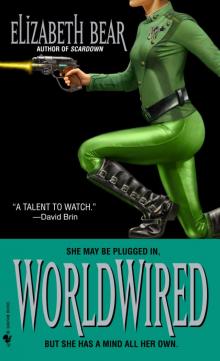 Worldwired
Worldwired Ancestral Night
Ancestral Night Hammered
Hammered The Red Mother
The Red Mother The Red-Stained Wings--The Lotus Kingdoms, Book Two
The Red-Stained Wings--The Lotus Kingdoms, Book Two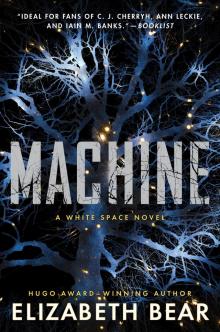 Machine
Machine Some of the Best from Tor.com: 2019 Edition
Some of the Best from Tor.com: 2019 Edition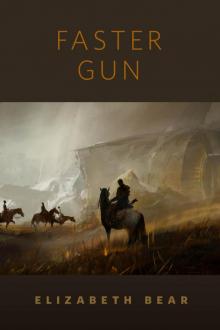 Faster Gun
Faster Gun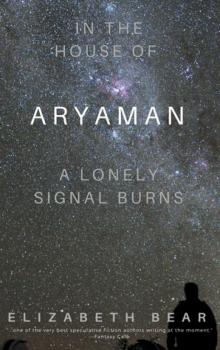 In the House of Aryaman, a Lonely Signal Burns
In the House of Aryaman, a Lonely Signal Burns Stone Mad
Stone Mad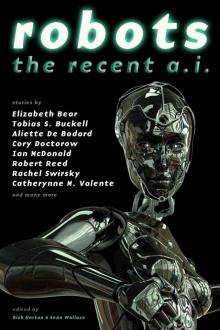 Robots: The Recent A.I.
Robots: The Recent A.I. The Tempering of Men
The Tempering of Men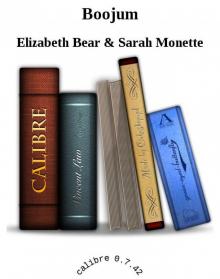 Boojum
Boojum Book of Iron bajc-2
Book of Iron bajc-2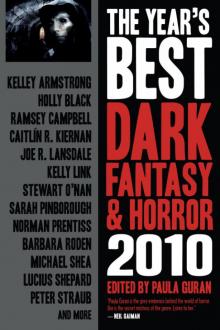 The Year's Best Dark Fantasy and Horror, 2010
The Year's Best Dark Fantasy and Horror, 2010 New Cthulhu 2: More Recent Weird
New Cthulhu 2: More Recent Weird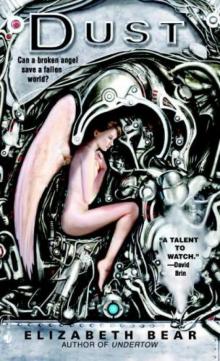 Dust jl-1
Dust jl-1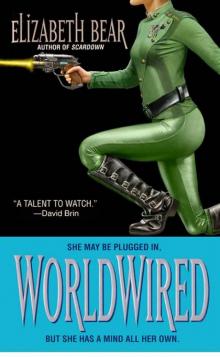 Worldwired jc-3
Worldwired jc-3 An Apprentice to Elves
An Apprentice to Elves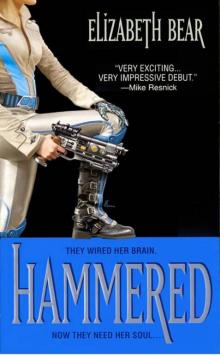 Hammered jc-1
Hammered jc-1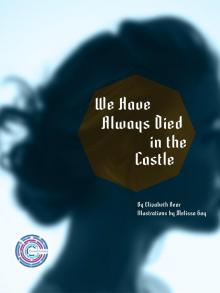 Crowd Futures: We Have Always Died in the Castle
Crowd Futures: We Have Always Died in the Castle Bone and Jewel Creatures bajc-1
Bone and Jewel Creatures bajc-1 Carnival
Carnival Some of the Best from Tor.com: 2012 Edition: A Tor.Com Original
Some of the Best from Tor.com: 2012 Edition: A Tor.Com Original The Stone in the Skull
The Stone in the Skull Scardown jc-2
Scardown jc-2 Hell and Earth pa-4
Hell and Earth pa-4 Undertow
Undertow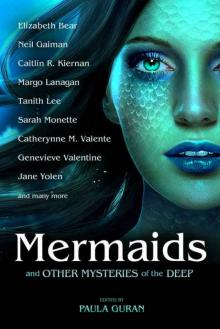 Mermaids and Other Mysteries of the Deep
Mermaids and Other Mysteries of the Deep A Companion to Wolves
A Companion to Wolves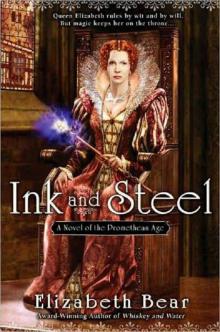 Ink and Steel pa-3
Ink and Steel pa-3